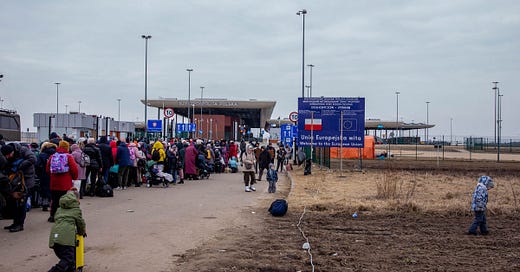How NATO Could Help Millions of Ukrainians Without Firing a Shot
The group's might has an enormous potential to change the refugee crisis.
The lines at the border of Poland and Ukraine are miles long. That is not hyperbole. To cross the border on Monday morning this week, a friend of mine dropped me off at the back of the growing line of cars in 30-degree weather with my two gigantic backpacks, and then I walked. I was lucky; it was only about half a mile. We got there early, to a crossing in a small town off the beaten path. I still waited for hours in the cold to cross. When I reached the Polish customs office, there was one line with two customs agents inspecting passports. On the far side, there were a few tents set up with hot drinks and aid and blankets, a smattering of aid workers, and a long cold road where refugees could wait for a bus or car.
The North Atlantic Treaty Organization has an operational budget of €289.1 million for civil programs and a military budget of €1.56 billion. In reality, this is pennies compared to the vast depths of resources that its member countries can bring to bear, by which I mean the U.S. defense budget. This is the most powerful military alliance in the world; the most powerful and well-equipped fighting conglomerate we have ever seen in history. An enormous amount of that firepower is now pointed at Russia, as the latter country proceeds with an impossibly brutal and short-sighted invasion of Ukraine, a central European country of some 44 million people.
Two million of these people have already fled. In the coming days that number will double and perhaps triple, quadruple, I do not know. But what I do know is that NATO has money and manpower and seemingly the will to shift the balance in this war. Until now that has looked like complicated proposals for arms deals; a military arrangement grasping for the sharp and brutal tools that it knows best. But there is so much more it could be doing. (We can debate NATO’s relative political usefulness and impact on global stability another time, but it’s here, and Russia’s invasion of Ukraine will almost certainly solidify the alliance for decades to come.) But I keep coming back to that border crossing; the handful of guards, the crowds of people.
Of the two million Ukrainians who have fled thus far, over 1.2 million of them have ended up in Poland, the closest and largest NATO member with a direct border to Ukraine. Poland’s ruling Law and Justice Party, which had previously run one of the most migrant-hostile refugee policy campaigns, has abruptly flipped to shelter Ukrainian refugees, offering funding for food, temporary lodging, and other benefits. Yet it is not enough. The Balkan Investigative Reporting Network reports that Poland’s refugee management has largely been left to volunteers and NGOs, with only lackluster participation by actual government entities, creating unmanageable strain among volunteers and sprawling, disorganized conditions in refugee facilities:
“The jokes are over, the governor is just giving interviews about how everything is under control, and we volunteers are already at the limit of our physical and mental endurance,” Joanna Niewczas, a volunteer coordinator at the Torwar hall, one of the largest refugee reception centres in Warsaw, wrote on social media on March 9.
She went on to complain about the lack of money for food and medicine, and the extremely poor hygiene in the camp that threatens the health of both refugees and volunteers.
The media is awash with stories of ordinary Poles welcoming refugees into their homes. This is a gesture that is clearly selfless, but one that should be wholly unnecessary if the U.S. and its allies were interested in alleviating the refugee crisis in a decisive way. The U.S. military claims that “humanitarian assistance and disaster response are core DoD capabilities.” If that’s true, there’s so much more we should be doing: C-5 Globemasters should be taking off multiple times a day from Polish airports, ferrying refugees to the U.S. and the rest of Europe; we should have massive deployments of support troops to create sustainable housing; we should be massively widening the border control points with Ukraine; we should be pressuring each and every member of NATO to open their borders unequivocally and enact similar steps to provide refuge and resettlement to victims of this war.
It is telling, of course, that these ideas only seem plausible given the West’s comparative embrace of Ukrainian refugees, as opposed to the millions who have fled violence in the Middle East and Africa over the past decade. Ideally, these principles would be applied to those needy people as well — from the limited response to Ukraine, we can see glimpses of the better world that is possible. But even now we see how those who have the power to make these changes seem disinclined to make them; that partnerships forged in war are often only interested in solving problems with force, too cowardly or lazy to apply the resources and bureaucracy of their military might to more peaceful aid. The power that NATO has consolidated is immense, and while it’s clear it cannot bring that to bear against Russia’s brutality directly, there’s still a chance its members can make an indelible mark on the lives of millions stricken by war without even firing a shot.






CROSBIE! YOU'RE ALIVE!
Also it's cute you think there's a chance in hell the powers that be in NATO are thinking about ordinary people in the midst of all their War Games fever dreams.